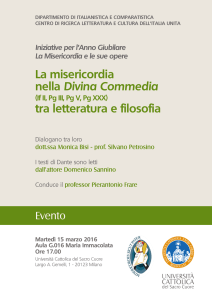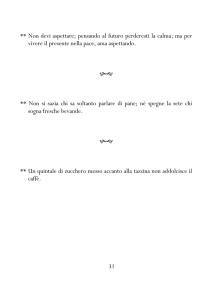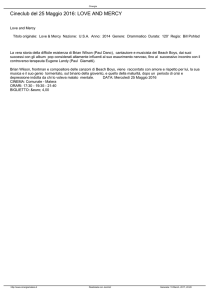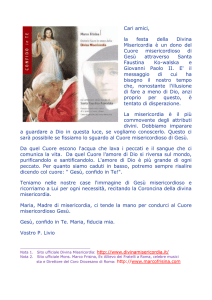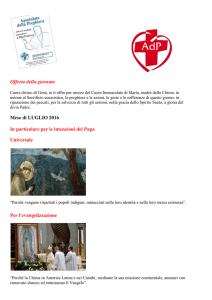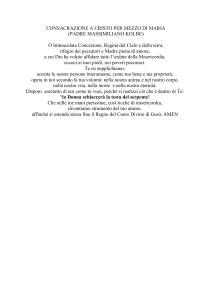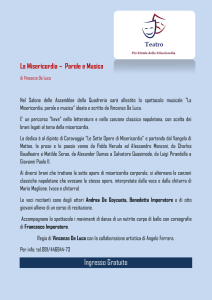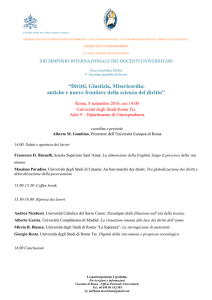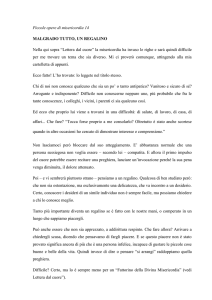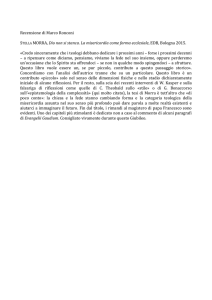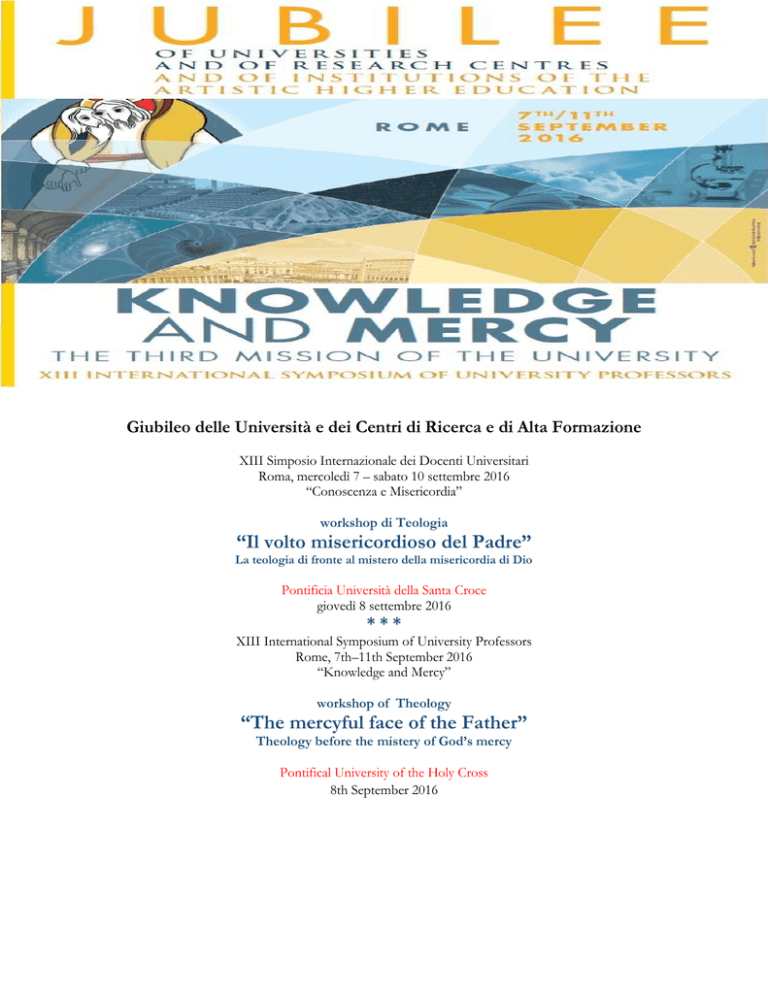
Giubileo delle Università e dei Centri di Ricerca e di Alta Formazione
XIII Simposio Internazionale dei Docenti Universitari
Roma, mercoledì 7 – sabato 10 settembre 2016
“Conoscenza e Misericordia”
workshop di Teologia
“Il volto misericordioso del Padre”
La teologia di fronte al mistero della misericordia di Dio
Pontificia Università della Santa Croce
giovedì 8 settembre 2016
***
XIII International Symposium of University Professors
Rome, 7th–11th September 2016
“Knowledge and Mercy”
workshop of Theology
“The mercyful face of the Father”
Theology before the mistery of God’s mercy
Pontifical University of the Holy Cross
8th September 2016
Finalità / Purpose
La sezione teologica del Simposio internazionale dei
docenti universitari si propone di esplorare il tema della
misericordia da diversi punti i vista. Il punto di partenza
irrinunciabile è quello scritturistico e storico-salvifico: la Sacra
Scrittura ci presenta un Dio «misericordioso e pietoso, lento
all’ira e ricco di amore e di fedeltà» (Es 34,6) e proprio per
questo impegnato con tutto se stesso a portare a compimento il
disegno di salvezza che Egli ha concepito dall’eternità. La
misericordia è dunque attributo fondamentale di Dio.
The theological section of the International
Symposium of University Professors aims to explore the theme
of mercy from the different points of view. The essential
starting point is from the Scripture and salvation history: Sacred
Scripture presents us a God "merciful and gracious, slow to
anger, and abounding in steadfast love and faithfulness" (Ex
34:6) and for this reason, committed to bring about the plan of
salvation that He has conceived from eternity. Mercy is
therefore a fundamental attribute of God.
L’uomo, creato a immagine e somiglianza di Dio, è
chiamato a essere misericordioso, come il Padre è
misericordioso (cfr. Lc 6,36). È questa la grande vocazione
dell’uomo: essere nel tempo l’immagine di Dio Misericordia; in
questo senso l’antropologia teologica è chiamata ad aprire
orizzonti per la vita dell’uomo.
Man, created in the image and according to the
likeness of God, is called to be merciful, as his Father is
merciful (cfr. Lk 6:36). This is man’s great vocation: to be in the
time image of the eternal God's mercy; in this sense, the
theological anthropology is called to open pathways for human
life.
Ma questa prospettiva non è limitata alla
divinizzazione del singolo uomo. Ciascuno è chiamato a dare al
mondo l’immagine di Dio Misericordia, perché «Da questo tutti
sapranno che siete miei discepoli» (Gv 13,35). In questa linea la
liturgia, la pastorale e la spiritualità possono rivelarsi feconde
espressioni della misericordia di Dio nella storia.
But this perspective is not limited to the deification of
the individual man. Each one is called to give to the world the
image of God’s mercy, because "By this all will know that you
are my disciples" (Jn 13:35). In this sense, liturgy, pastoral and
spirituality can prove to be fruitful expressions of God’s mercy
in history.
Struttura del Convegno
“Il volto misericordioso del Padre”
Structure of the Conference
“The mercyful face of the Father”
ore 9.00 Saluti introduttivi
ore 9.30 Introduzione di saluto di Kyrillos Katerelos,
vescovo ortodosso di Abydos (Grecia):
“La Misericordia del Padre nella parabola evangelica del
figliol prodigo”
Coordina: prof. G. Zaccaria (PUSC)
h. 9.00 a.m. Greetings
ore 9.30 Introduction by Kyrillos Katerelos, orthodox
bishop of Abydos (Greece)
“The Father’s mercy in the Gospel parable of the
prodigal son”
Chairman: prof. G. Zaccaria (PUSC)
ore 10:15-11:00
1° Sessione: L'immagine di Dio Misericordia
h. 10:15-11:00 a.m.
1st step The image of God-Mercy
«Dio misericordioso e pietoso, lento all’ira e ricco di amore e
di fedeltà» (Es 34,6). La misericordia come attributo
fondamentale di Dio: base biblica e storica.
«God merciful and gracious, slow to anger, and abounding in
steadfast love and faithfulness» (Ex 34:6). Mercy as a
fundamental attribute of God: biblical and historical basis.
Prof. R. Vignolo (Italia)
Prof. R. Vignolo (Italia)
ore 11:00-11:30
Intervallo
h. 11:00-11:30 a.m.
Break
2° Sessione: Siamo immagine di Dio misericordioso
2nd step We are the image of mercyful God
Coordina: prof. A. Sabetta (PUL)
Chairman: prof. A. Sabetta (PUL)
Prof. Paul O’Callaghan (Irlanda)
Prof. Paul O’Callaghan (Irland)
Prof. Juan Luis Lorda (Spagna)
Prof. Juan Luis Lorda (Spain)
ore 13:00-15:00
Pausa pranzo
h. 01:00-03:00 p.m.
Lunch break
ore 15:00-16:00
3° Sessione: Comunicazioni e Sessioni speciali
Comunicazioni teologiche dei docenti pervenuti
divisi in aree tematiche, e panels.
h. 03:00-04:00 p.m.
3rd step Communications and Special Sessions.
Theological communications divided by subject
areas, and panels.
ore 16:00-16:30
Coffee break
h. 04:00-04:30 p.m.
Coffee break
ore 16:30-18:00
4° Sessione: Diamo al mondo l'immagine di Dio
Misericordia
h. 04:30-06:00 p.m.
4th step We give to the world the image of God-Mercy
Chairman: prof. J.L. Gutiérrez Martín (PUSC)
Chairman: prof. J.L. Gutiérrez Martín (PUSC)
Prof D. Fagerberg (USA)
Prof D. Fagerberg (USA)
Prof. P. Asolan (Italia)
Prof. P. Asolan (Italia)
ore 18.00 Conclusioni: J.L. Gutiérrez Martín (PUSC)
h. 06:00 p.m. Conclusions – J.L. Gutiérrez Martín
(PUSC)
«Siate misericordiosi, come il Padre vostro è misericordioso»
(Lc 6,36). L'antropologia teologica della misericordia
«Da questo tutti sapranno che siete miei discepoli» (Gv 13,35).
Liturgia, pastorale, spiritualità, come espresioni della
misericordia di Dio nella storia.
«Be merciful as your Father is mercyful» (Lk 6:36). The
theological anthropology of mercy.
«By this all will know that you are my disciples (Jn 13:35)».
Liturgy, pastoral and spirituality as expressions of God’s
mercy in hisotry.
International speakers
Prof. David Fagerberg, Notre Dame University (USA)
ABSTRACT
The Church as Pastoral Icon of the Mercy of the Good
Shepherd.
La Chiesa come Icona pastorale della misericordi del
Buon Pastore.
Jesus is an icon of the merciful face of his Father because
as pastor of his Church he fulfills the two tasks of a
shepherd: to protect his sheep and lead them to pasture.
The Church is called to be an icon of Jesus the Good
Shepherd. Her pastoral ministry proclaims the Kingdom of
God through preaching and sacrament, and leads humanity
to eternal life. We will better understand the Church’s
sacramental face to the world if we can recover the
liturgical depths of pastoral theology. Each Christian
receives grace to become mercy.
Gesù è un'icona del volto misericordioso del Padre, perché
come pastore della sua Chiesa egli soddisfa i due compiti di
un pastore: proteggere le sue pecore e condurle al pascolo.
La Chiesa è chiamata ad essere un’icona di Gesù Buon
Pastore. Il suo ministero pastorale annuncia il Regno di
Dio attraverso la predicazione e i sacramenti, e conduce
l'umanità alla vita eterna. Capiremo meglio il volto
sacramentale della Chiesa di fronte al mondo, se saremo in
grado di recuperare le profondità liturgiche della teologia
pastorale. Ogni cristiano riceve la grazia per diventare
misericordia.
Prof. Roberto Vignolo, Fac. Teologica dell’Italia settentrionale (Italia)
ABSTRACT
Da Giona ben 'amittay a Gesù, Figlio dell’uomo –
ovvero: quando la misericordia si riveste di sapienza
From Jonas ben ‘amittay to Jesus, son of the man when mercy becomes covered with wisdom.
Misericordia mai senza giustizia – ma soprattutto mai senza
sapienza...
Ponendo in parallelo due grandi meshalim rispettivamente di
Antico (Il Libro di Giona), e di Nuovo Testamento (la
grande parabola della misericordia restituita da Gesù
attraverso Lc 15) – entrambi non a caso caratterizzati da
una splendida "finale aperta” – si cercherà di evidenziare la
divina sempre sapiente strategia dell'incontro salvifico
perseguita da Dio misericordioso, che ci chiede una
risposta di consapevole e ben motivata empatia nei
confronti del suo opus proprium portato a compimento da
Gesù
Mercy never without justice - but also never without
wisdom...
Placing in parallel two large meshalim respectively of the
Old (The Book of Jonah), and the New Testament (the
great parable of mercy told by Jesus in Lk 15) - both
characterized by a wonderful "open end" – we will try to
highlight the divine, always wise, strategy of the salvific
encounter pursued by the merciful God, who asks us to
respond with a conscious and well motivated empathy for
the opus proprium accomplished by Jesus.
Prof. Paolo Asolan, Pontificia. Università. Lateranense (Italia)
ABSTRACT
Convertire Giona. Chiamati a manifestare la
misericordia di Dio
To convert Jonah. Called to manifest God's mercy
L’azione ecclesiale ha bisogno di tornare sempre al suo
cuore che è di essere strumento e manifestazione della
salvezza in Cristo.
La misericordia fissa uno stile e un contenuto che precede
e dà consistenza a qualsiasi successiva azione. Per questo
anche la pastorale nel suo insieme e gli operatori pastorali
in particolare hanno bisogno di convertirsi continuamente
al loro compito fondamentale, lasciandosi convertire dalla
conoscenza del Dio vivo e vero e dalla missione e da
coloro ai quali è rivolta, ad intra e ad extra Ecclesiae.
The action of the Church needs to return every time to his
heart which is to be the instrument and manifestation of
salvation in Christ.
Mercy sets a style and content that precedes and gives
consistency to any subsequent action. For this also the
pastoral as a whole, and pastoral workers in particular,
need to be continually converted to their main task, letting
to be converted by the knowledge of living and true God
and by the mission and by those to whom it is addressed,
ad intra and ad extra Ecclesiae.
Prof. Juan Luis Lorda, Universidad de Navarra (Spagna)
ABSTRACT
Il cuore centro della misericordia. Antropologia e
mistica del cuore
The heart, center of mercy. Anthropology and
mystique of the heart
Il cuore è la sede della misericordia.
Il concetto biblico di “cuore” come centro della persona
è in aperto contrasto con l’intellettualismo della filosofia
greca; i Padri hanno fatto proprio questo concetto anche
se esso è più presente nella tradizione teologica orientale
rispetto a quella occidentale. A partire dal cuore di Dio,
dal grande paradosso di un Dio spirituale e
misericordioso e dal mistero che racchiude, noi uomini
possiamo guardare al Dio che soffre per imparare a
vivere la misericordia di Dio in Cristo.
The heart is the place of mercy.
The biblical concept of "heart" as the center of the
person is in sharp contrast with the intellectualism of
Greek philosophy; Church’s Fathers have embraced this
concept even if it is more present in the Eastern
theological tradition than in the Western. Starting from
the heart of God, the great paradox of a spiritual and
merciful God and the mystery that encloses, we men can
look to God who suffers to learn how to live God's
mercy in Christ.
Prof. Paul O’Callaghan, Pontificia Università della Santa Croce (Irlanda)
ABSTRACT
Dio è misericordioso?
Is God merciful?
Il fatto che Dio agisca con misericordia nei confronti
della creatura è rivelato senz’ombra di dubbio nella
Bibbia. Questa convinzione è centrale per impostare in
modo adeguato la pastorale della Chiesa, che dovrebbe
essere sempre “luogo della misericordia” (Evangelii
gaudium, 114). Però il fatto che Dio sia misericordioso nei
confronti della creatura, fragile e peccatrice, significa che
Dio stesso, nella propria vita trinitaria immanente, è
misericordioso? Al margine del mondo creato e caduto,
Dio agisce con misericordia? Questa relazione considera
tre possibili risposte: che la misericordia divina
appartenga esclusivamente all’economia, all’ordine delle
creature; che essa si esprima appieno nell’immanenza
divina, tra le persone divine; e che essa trovi la sua radice
vitale nella Trinità stessa.
The fact that God acts with mercy towards the creature
is revealed beyond every reasonable doubt in the Bible.
This belief is central to set properly the ministry of the
Church, which should always be “the place of mercy”
(Evangelii gaudium, 114). But the fact that God is merciful
towards the creature, fragile and sinful, means that God
Himself, in his immanent trinitarian life, is merciful? At
the edge of the created and fallen world, does God act
with mercy? This conference considered three possible
answers: that divine mercy belongs exclusively to the
economy, to the order of creatures; that it fully expresses
the divine immanence, between the divine persons; and
that it finds its vital root in the Trinity itself.

